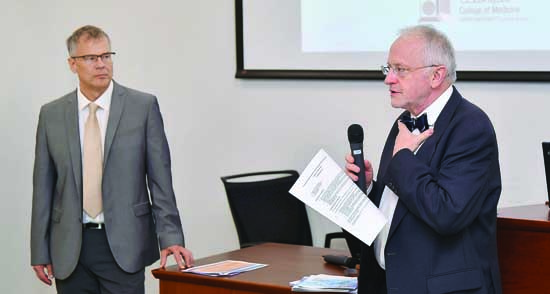

DOHA: A regional symposium on accreditation of medical colleges in the Middle East was organised by College of Medicine at Qatar University (QU).
Expert groups discussed recommendations and future directions concerning accreditation of medical education in the region.
Representatives of 18 medical colleges in the region, with Dr Egon Toft, Vice-President, QU, and Dean of the college, senior officials from the Supreme Council of Health, Supreme Education Council, Weill Cornell Medicine-Qatar, World Health Organisation, World Federation of Medical Education, Association for Medical Education in the Eastern Mediterranean Region (AMEEMR), UAE Commission for Academic Accreditation, American University of Beirut, and Saudi National Commission for Academic Accreditation and Assessment attended.
Prof David Gordon, President, WFME, presented thoughts on future directions of accreditation of medical colleges; Prof Ibrahim Alwan, President, AMEEMR, reflected on accreditation in the EMRO Region, and Prof Badr Aboud Ela, Director, CAA, discussed the UAE experience in accreditation of higher education universities and programmes.
Presentations on the current status of accreditation of health profession education in Qatar and Bahrain were given by Dr Samar Abou Al Soud, Acting CEO, SCH; and Prof Sameer Otoom, President, Royal College of Surgeons in Ireland (RCSI) Bahrain; and Prof Khaled Tabbara, Vice-President, Arabian Gulf University, Bahrain.
Dr Toft said: “The topic of accreditation will gain increasing importance as the college strives to measure its academic quality against objective international standards.”
The dean of the college said for medicine, entities in the US, Canada, Australia and European countries accredit colleges within their geographic boundaries.
“Many countries in the region, including Qatar, do not have their accreditation entities for medical education and this is what makes the meeting so important,” Dr Toft added.
Prof Hossam Hamdy, Associate Dean, Academic Affairs at the college, said the absence of an accrediting entity for medical colleges in Qatar, the college has established approaches for quality assurance and programme evaluation.
He said the college is expected to undergo three international programme evaluation visits during the first eight years — an initial visit at the end of Year two, an interim visit at the end of Year 4 and a full programme evaluation two years after graduating the first batch.
He said the college will make approaches to the Liaison Committee on Medical Education — the accrediting entity for educational programmes at US and Canadian schools of medicine — to visit the college and evaluate its programmes against LCME standards in addition to Qatar’s efforts to develop a national accreditation entity through this meeting and similar initiatives. The Peninsula




